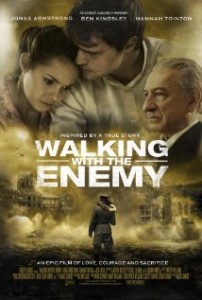Dolphin Tale 2
Posted on September 11, 2014 at 5:59 pm

The warmest, wisest, most pleasurable live-action family film of the year is “Dolphin Tale 2,” even better than the 2011 original. This really is that rare movie for the whole family.
The first film was inspired by the true story of Winter, a rescued dolphin who was able to thrive in Florida’s Clearwater Marine Aquarium after an innovative new prosthetic tail helped to protect her spine and allow her to swim. She has been an inspiration to millions of visitors in person and via webcam, especially to wounded veterans and other adults and children with disabilities. In the original, directed by Charles Martin Smith (Terry the Toad in “American Graffiti” and Farley Mowat in Never Cry Wolf, a sensitive loner named Sawyer (Nathan Gamble) bonds first with the wounded dolphin and then with the staff who care for the marine animals, especially aquarium head Clay (Harry Connick, Jr.) and his pretty daughter Hazel (Cozi Zuehlsdorff). Ashley Judd played Sawyer’s mother, Kris Kristofferson played Clay’s houseboat-dwelling dad, and Morgan Freeman played crusty Dr. McCarthy, who figures out how to make the prosthetic comfortable and stable.
Everyone returns for this follow-up, and this time Charles Martin Smith does triple duty as writer, director, and actor, appearing as a strict but not unsympathetic USDA official responsible for making sure the facility meets federal standards in caring for the animals. He may refer to Winter at CMA1108, but he is trying to do what is best for her.
The kids have gone from middle school to high school. They are now experienced marine animal specialists, and spend most of their time at the aquarium, much of that in the water. We see how capable and knowledgeable they are when they assist in the rescue of an injured dolphin they name Mandy and a sea turtle ensnared in fishing line they dub Mavis. And we see how deeply they care for the animals when the veteran of their dolphin population, a 40-year-old deaf dolphin who is “paired” with Winter, dies suddenly. This is more than a sad loss. Dolphins are deeply social creatures. If Winter cannot or is not willing to be be paired with another dolphin, she will die. The USDA inspector says that if they cannot find a friend for Winter in 30 days, she will have to be moved.
Mandy’s arrival seems providential. But then the best thing happens, which is also the worst thing. They are able to restore Mandy to health. But that means that she can no longer remain in captivity, which is just for animals who can no longer take care of themselves. The motto of the facility is three words: rescue, rehabilitate, release. “You didn’t build this place to keep animals,” Clay’s father reminds him. “You built it to heal them and let them go.” The wrenching task of weighing those competing considerations is sensitively presented as a moral issue, an economic issue, and as a part of growing up that Hazel and Sawyer must understand. It is an issue of more complexity than we normally get to see in family films, and it is presented with exceptional insight. A scene where Hazel follows Sawyer’s mother’s advice to speak to Clay the way she would like to be spoken to is a small gem that got some appreciative laughs of recognition from the audience. Smith knows his audience, though, and expertly seasons the storyline with cute animals, especially Rufus the pelican, who is back for more comic relief. Even with Rufus, though, the slapstick moments are just part of the story. His protective concern for Mavis is genuinely touching.
A storyline about whether Sawyer will accept an opportunity to take a special semester at sea is less intriguing. But Gamble’s quietly sincere and thoughtful performance grounds the film, with Zuehlsdorff (who provides a sweet song over the closing credits) more ebullient, but never less than completely real and in the moment. The completely natural performances of the two leads perfectly matches the sun-drenched naturalism of the setting, utterly at home in the water, interacting with the dolphins, or struggling to grow up. When Dr. McCarthy sits down next to the conflicted Sawyer to hand him a family heirloom, Sawyer says knowingly, “I’m about to get a lesson here, aren’t I?” He is, and we are, too, but it is a good lesson and it goes down easy. So does the film, ambitious in scope but light in presentation. And it is no disrespect to the movie to say that the best part is the closing credits, where we see Wounded Warriors and other people with disabilities coming to visit Winter and Hope for inspiration and, somehow, a sense that they are being understood and cared for.
Parents should know that this film includes mild peril, some scenes of animal and human injuries and a sad animal death.
Family discussion: What was the lesson of the watch? What were the best reasons for releasing Mandy? For keeping her? Did they make the right decision?
If you like this, try: The original film — and watch Hope and Winter online



